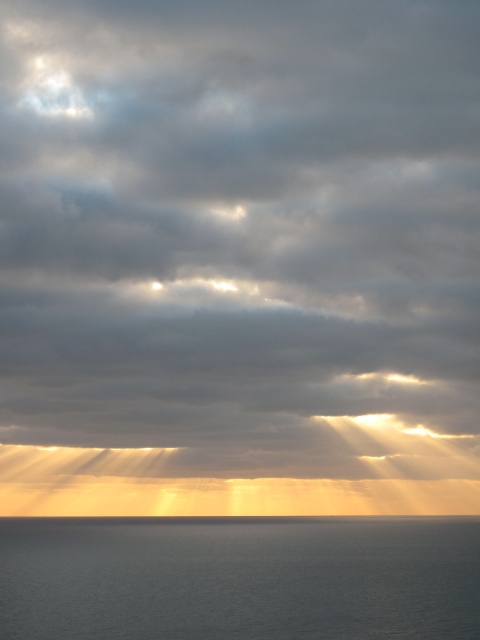Not quite reaching Beachy Head (and not jumping off it)
January 19, 2012 § Leave a comment
I caught a train to Brighton and then a bus to Seaford, which looked, from Google Maps and a night-eyed 1 a.m. search, to be the nearest bit of beautiful coast to London. I needed head clearing and walking and to see the sea.[1]
At London Bridge I collected my ticket, stopped to pick up a penny, bought coffee and nearly missed the train. The sidings, as we pulled out of the city, were ski slopes of frost and chicken wire and the sun was hitting things at hard angles.
On the bus, four foreign exchange students were having a conversation in slow, correct English. The dog of my parents, said one German girl, must be put down. Put down – not killed; the term seemed carefully learned. Perhaps she often described this scenario, or it was close to her heart.
I asked two women bound for Eastbourne where to begin a walk towards Beachy Head, sparking off a murmured discussion that lasted the forty-minute drive. The consensus was “somewhere after Seaford,” so I waited for a tap on the shoulder. We passed through a place called Peacehaven. Across the aisle, the conversation became suddenly intense: “…it is a Gospel of love; not about going to hell, but about a God who loved us so much that he…” The girl speaking, maybe Spanish, leaned towards her German companion. “Our brains are too small, to comprehend…” she said, and they laughed together and agreed.
I got off the bus (with the exchange students and, it turned out, almost everyone else) near a pub called the Golden Galleon. It sits on an estuary, where a river meanders through salt marsh to the sea. “The cause of meandering is not fully understood”, states a site I later checked, which also names the estuary as Cuckmere Haven. It marks the start of the Seven Sisters, which I expected to be rock stacks out in the water, but turned out to be seven hills leading down the coast.
And then there are chalk cliffs and the sea. Walking, I think about naval battles and the film of Brighton Rock, which has a scene in the cliff top darkness.[2]
It’s strange that Beachy Head is both the destination of hikers and a place associated with death – a “favourite” suicide spot; as if any individual could have a favourite. Walking towards it – walking on the cliffs at all – brings up the thought of what it would be like to step over the edge, or to plunge off; to run at the brink, or to fall. People seek out high places, but why? Do we just love views, or want to be in command of our surroundings? And is part of it – the flip side of vertigo – that we like to experiment with the thought that we’re a step away from death; and in control of it.
Clouds have come up, and the sea looks like a cloth onto which someone has spilled the sun. The sea can be terrifying or calming. I think about the conversation on the bus, and about how huge the human mind seems to me, what changes it’s capable of. I wonder how many people come to Beachy Head with the intention of jumping, and look at the water, and go home. Without a death there is no news and no story. But maybe the sea saves lives as well as ending them.
At the lighthouse near Birling Gap, a sign reads Beachy Head 3 Miles. The cold cranks up a notch and the light changes; the sun has already started to set. This means turning back, walking west. The light falling in sheets on the sea is now the colour of dessert wine, and around the feet of the cliffs the water is milky with chalk.
On the train home I met a man called Andrew Schotter[3], a bus driver who also came down to look at the ocean. He had won £76 on Brighton Pier; I remembered the penny found at London Bridge and we decided it was a lucky day. Before becoming a bus driver Andrew drove ambulances. One day he helped transfer a woman between two hospitals. She was in a wheelchair, paralysed from the neck down. He asked what had happened to her; she had jumped from Beachy Head.
I, Andrew, the exchange students – for different reasons we made our way to the sea. I didn’t make it quite as far as Beachy Head, and am not reaching, in this post, a conclusion. Walking, seeing something beautiful, recognising the size of the mind. The cause of meandering is not fully understood.
[1] I directed a play all about a journey to the sea, which was translated from French. In the play, the play between the words la mère (mother) and la mer (sea) was important; but completely lost in the English – where the closest sonic association with the sound of “sea” is the concept of sight.
[2] Released in 2010 to lukewarm reviews, it’s infinitely better than – for example – 2011’s well received but terrible The Deep Blue Sea.
[3] I’m using his whole name because Andrew had never Googled himself. When I did so, I found that an Andrew Schotter is Professor of Economics at New York University, and author of several books about positive, normative, micro and free market economics. If the Andrew Schotter from that journey ever Googles himself, maybe he’ll find this.
